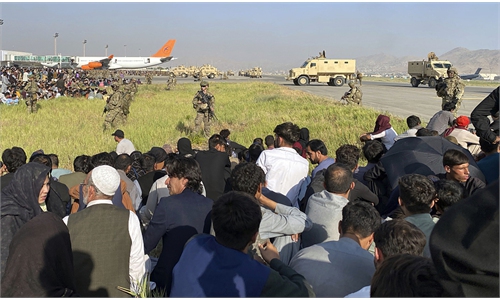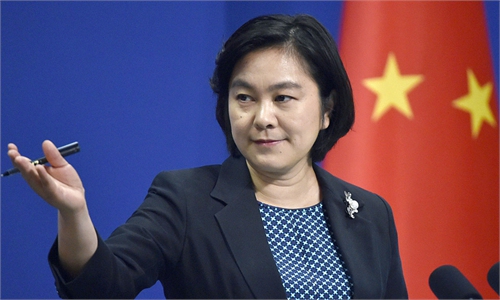China, Pakistan push for regional security amid lingering uncertainty in Afghanistan

Afghanistan Photo: VCG
As the Taliban declared the formation of the "Islamic Emirate of Afghanistan" on Thursday, the 102nd anniversary of the country's independence from British rule, observers believe the power struggle in the country will continue for a while, and China and Pakistan, the two important neighbors of the war-torn country, are coordinating closely to facilitate a smooth transition in Afghanistan for regional stability.
Analysts warned that the unrests in Afghanistan could provide a hotbed for terrorists targeting China's Xinjiang and its interests overseas, such as the China-Pakistan Economic Corridor (CPEC) projects, where enhanced communication and coordination between China and Pakistan is required to tackle potential threats.
The Taliban had vowed to establish through negotiations an open and inclusive Islamic government.
Some people believe the Taliban is more sober and rational compared with the last time it was in power, but prospects of the country remain uncertain. A group of Afghan leaders tried to rally forces to resist the Taliban in Panjshir Valley and former Afghan president Hamid Karzai had met with Taliban representatives in Doha on the power transfer.
Chinese State Councilor and Foreign Minister Wang Yi said in a phone call with Pakistani Foreign Minister Shah Mahmood Qureshi that the two Afghan neighbors need to coordinate to support a stable transition in the war-torn country and play constructive roles in maintaining regional peace and stability.
Qureshi said Pakistan and China are countries most expecting Afghanistan to realize peace, and as all-weather strategic cooperative partners, they ought to strengthen coordination.
Pakistan, he said, stands ready to strengthen communication with China, push the Taliban to fulfill its pledges on political structure, establish a multilateral coordination mechanism involving the neighboring countries of Afghanistan, and urge the international community to jointly support the efforts of various Afghan factions to achieve peace and stability.
Pakistan had said it will not take unilateral action to recognize Taliban, and on August 16, it received a delegation of non-Pashtuns from Afghanistan, which is expected to negotiate with the Taliban in Islamabad, media reported.
Qian Feng, director of the research department at the National Strategy Institute at Tsinghua University, told the Global Times that China and Pakistan share similar stances and interests on Afghan issues, judging from the official expressions of the two countries.
All-weather strategic cooperative partnership between China and Pakistan enabled the two countries to act in coordination and bring about positive changes to the region, Qian said.
China, which always stands neutral without interfering in others' internal affairs, can mediate as a responsible regional major power, while Pakistan's ethnic connections with Afghanistan also gives it an advantage as a broker, the expert said, noting if peace and stability is restored, China, Pakistan and Afghanistan also have the potential to cooperate on economic development, tackle poverty and counter terrorism.
Zhu Weilie, director of the Middle East Studies Institute of the Shanghai International Studies University, told the Global Times that China and Pakistan are important members of the Shanghai Cooperation Organization (SCO), and Afghanistan is an observer country of it. The platform can be used to discuss and coordinate international actions.
But experts warned the looming threats of Taliban lacking full control of Afghan territories, which could turn the place into a gathering of terrorists and export violence to neighboring countries.
Qian cited the terrorist attack on the staff of the Dasu hydropower station, which killed nine Chinese and four Pakistanis in July. Preliminary investigations found the Pakistani Taliban was responsible, while Indian and Afghan intelligence agencies were involved.
If the security situation in Afghanistan doesn't improve soon, terrorist activities may flare up in the country and threaten China's Xinjiang and regional countries where China has interests, Qian said.
Though the Afghan Taliban had vowed not to allow any force to use Afghan territories to attack another country, Qian noted it may lack real control of the complex power branches and remote mountainous areas.
Some branches of the Afghan Taliban had taken in members of the East Turkistan Islamic Movement (ETIM), a terrorist group which poses a direct threat to China's national security and territorial integrity. Wang Yi, during the Afghan Taliban's visit to China in late July, reiterated China's stance - it hopes the Afghan Taliban will make a clear break with all terrorist organizations, including ETIM.



